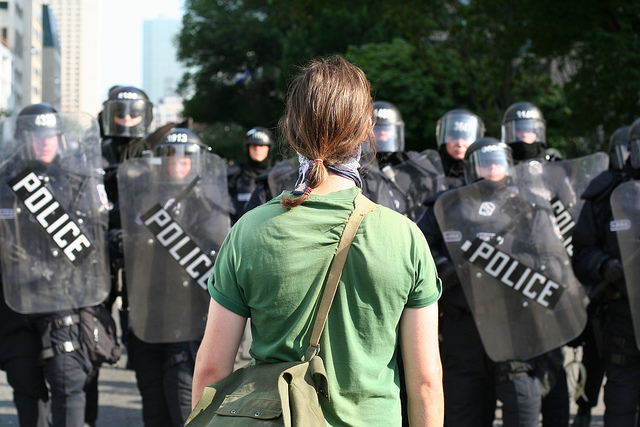Like this article? rabble is reader-supported journalism. Chip in to keep stories like these coming.
The Council of Canadians welcomes the class-action lawsuits representing the more than 1,000 people whose civil rights were violated at the G20 summit on June 26-27, 2010 in Toronto.
The Toronto Star reports:
“Ontario’s top court [the Ontario Court of Appeal] gave the green light [on April 6] to two class-action lawsuits covering more than 1,000 people who say their rights were violated when they were detained by police during the G20 summit six years ago. …The lawsuits against the Toronto police board call for a combined $45 million in basic damages and $30 million in punitive damages, lawyers for the detainees said.”
CBC adds:
“The lawsuits allege people were mass-arrested indiscriminately and held in ‘inhumane conditions’ at a detention centre located inside an unused film studio on Eastern Avenue. ‘What happened to them was terrible. They were arrested without cause,’ [Kent] Elson [a lawyer for the plaintiffs] said. ‘That shouldn’t happen in a democratic country like ours.'”
The principle is that the police cannot arrest a large group of people indiscriminately in the hope that one of those persons is a person they believe may be engaged in criminal activity.
Most of the people arrested were later released without charge.
The Council of Canadians has been calling for a public inquiry into the G20 summit since June 2010.
In June 2011, we also joined with the Ontario Federation of Labour, Amnesty International and No One Is Illegal to call for a judicial inquiry that would look not only at police abuses — by the RCMP, OPP and multiple police forces — during the G20 summit, but at the politicians who directed the police and the summit itself.
To date there have been reports by Ontario ombudsman Andre Morin, former chief justice Roy McMurtry, the House of Commons Standing Committee on Public Safety and National Security, a Toronto police internal review, the RCMP Commission for Public Complaints, the Office of the Independent Police Review Director, and a Toronto Police Services Board civilian review.
In August 2015, the senior Toronto police offer who ordered the kettling was found guilty of exercising unlawful or unnecessary authority and of discreditable conduct under the province’s Police Service Act. Global News has reported, “Retired Judge John Hamilton said in his 150 page ruling that [Supt. Mark] Fenton’s decision for the mass arrest showed a lack of understanding of the right to public protest.”
Now, the Toronto Star highlights, “Speaking for a unanimous three-judge panel, Associate Chief Justice Alexandra Hoy said the multimillion-dollar lawsuits would send a stronger message than non-binding recommendations issued after the tumultuous world leaders’ summit.” She writes, “In my view, the remedies sought by the plaintiffs, which include a declaration that class members’ Charter rights have been violated and an award of damages, would be stronger instruments of behaviour modification.” Elson says, “There have been non-binding recommendations before but now we have binding legal process, which can actually make changes happen.”
The Guardian notes:
“A similar lawsuit was launched in Washington, D.C. after the arrest of some 700 protesters and bystanders near the World Bank and International Monetary Fund buildings in 2000. One decade later, a federal judge approved a US$13.7M settlement for those held in the mass arrest.”
Pending further appeals from the Toronto police, the class-action lawsuits are expected to be heard by the court this fall.
A G7 summit will take place in Canada in May-June 2018.
The Council of Canadians has called for the exclusive and costly G7 and G20 summits to be scrapped and for national leaders to meet instead in the more democratic forum of the G193, otherwise known as the United Nations General Assembly. We have noted that the $1 billion spent on the two-day G20 summit in Toronto could have been used instead to provide clean drinking water to about 50 million people.
Photo: Kate Raynes-Goldie/flickr
Like this article? rabble is reader-supported journalism. Chip in to keep stories like these coming.




